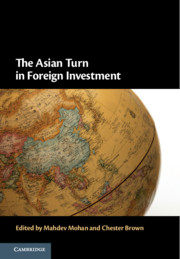Book contents
- The Asian Turn in Foreign Investment
- The Asian Turn in Foreign Investment
- Copyright page
- Contents
- Figures
- Tables
- Contributors
- Acknowledgements
- Table of Cases
- Table of Treaties
- Abbreviations
- Part I Introduction
- Part II National Approaches within Asia to the Regulation and Protection of Foreign Investment
- Part III The Rebalancing of Regulatory Space and Investor Protection in Asia
- Part IV Multilateral Rule-Making in Asia on Trade and Investment: From ASEAN to the Comprehensive and Progressive Agreement for Trans-Pacific Partnership
- Part V Emerging Issues
- Part VI What Lies Ahead?
- 21 Reconciling Public Interests with Private Interests in International Investment Arbitration and Securing Effective Remedy for Investment–Related Human Rights Violations
- 22 Rebalancing Investment Treaties and Investor–State Arbitration in the Asian Region
- Index
22 - Rebalancing Investment Treaties and Investor–State Arbitration in the Asian Region
from Part VI - What Lies Ahead?
Published online by Cambridge University Press: 13 August 2021
- The Asian Turn in Foreign Investment
- The Asian Turn in Foreign Investment
- Copyright page
- Contents
- Figures
- Tables
- Contributors
- Acknowledgements
- Table of Cases
- Table of Treaties
- Abbreviations
- Part I Introduction
- Part II National Approaches within Asia to the Regulation and Protection of Foreign Investment
- Part III The Rebalancing of Regulatory Space and Investor Protection in Asia
- Part IV Multilateral Rule-Making in Asia on Trade and Investment: From ASEAN to the Comprehensive and Progressive Agreement for Trans-Pacific Partnership
- Part V Emerging Issues
- Part VI What Lies Ahead?
- 21 Reconciling Public Interests with Private Interests in International Investment Arbitration and Securing Effective Remedy for Investment–Related Human Rights Violations
- 22 Rebalancing Investment Treaties and Investor–State Arbitration in the Asian Region
- Index
Summary
Asian economies are attempting to (re)balance their interests in fostering burgeoning outbound investment and attracting inbound investment, while preserving appropriate regulatory autonomy, while maintaining an attractive environment for foreign investors. To understand the issues and the likely future trajectory for international investment law in the region, this chapter first introduces Poulsen’s comprehensive recent study focusing on the experiences of developing countries world-wide, but including analyses of several Asian states (as outlined in Part 2 below). Despite marshalling powerful arguments and evidence for manifestations of ‘bounded rationality’ in BIT negotiations and drafting, some limits to his theory are suggested by a closer analysis of several countries in the region (Part 3). Given such historical experiences, it seems premature to abandon altogether the current treaty protection regime. Nonetheless, a combination of new approaches is worth considering under existing treaties, including more principled use of proportionality testing and deference to host state decision-making (Part 4.1). Greater care is also needed when assessing the net benefits from entering into new treaties, including the latest research into whether investor-state dispute settlement provisions lead to significantly greater cross-border investment (Part 4.2).
Keywords
- Type
- Chapter
- Information
- The Asian Turn in Foreign Investment , pp. 379 - 398Publisher: Cambridge University PressPrint publication year: 2021
- 3
- Cited by



